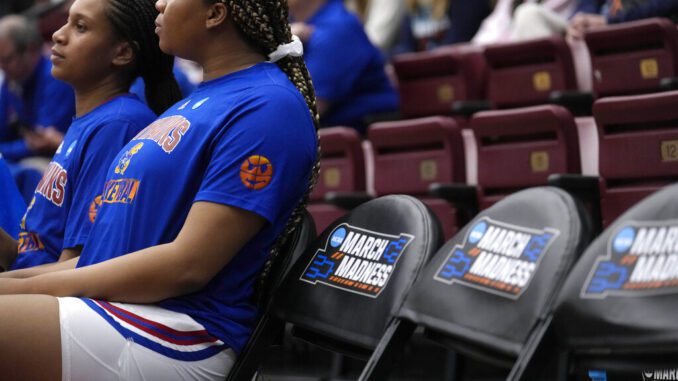
Title IX opened the door for countless young women to participate in high school and intercollegiate athletics. It also created coaching and administrative opportunities in sports previously unavailable to females.
Fifty years after its passage as part of the Educational Amendments of 1972, it remains as — retired NC State athletic director Debbie Yow described it — “one of the most important pieces of civil rights legislation ever passed in our nation.”
And yet for all the progress that has been made, its goal of full gender equity remains an elusive goal.
That became vividly clear in March 2021 through a viral video posted by Oregon basketball player Sedona Prince.
The TikTok revealed an embarrassing disparity in the weight room facilities and other services provided for the women in their COVID-mandated NCAA Tournament “bubble” compared to those offered to their male counterparts. Similar issues were also reported at the women’s softball and golf national tournaments.
Although the NCAA is not bound by the provisions of Title IX since it is an independent organization that does not directly receive federal funds, Prince’s video spurred the governing body for college sports to take action.
It hired a law firm to perform a gender equity review and made a series of sweeping changes based on the findings, including use of the trademark “March Madness” for both its men’s and women’s basketball events.
“Sedona Prince’s (TikTok) about the inequities of March Madness sent a powerful message by just asking the simple question: Why aren’t we treated fairly?” said Amy Perko, a former Wake Forest basketball star who now serves as CEO of the respected Knight Commission on Intercollegiate Athletics.
“She’s said that she really didn’t understand that what she was posting was a Title IX issue. It’s just that basic question of fairness that his new generation is asking and, frankly, there’s no good answer. That’s the most powerful message that has triggered change.”
Title IX, which was passed by Congress on June 23, 1972, and signed into law by then-President Richard Nixon, does not specifically mention sports.
The 37-word clause simply states that “no person in the United States shall, on the basis of sex, be excluded from participation in, be denied the benefits of, or be subjected to discrimination under any education program or activity receiving Federal financial assistance.”
Its main intent was to address sex discrimination in education, such as quotas that limited the number of female applicants admitted into medical and law schools. But it quickly began being applied to athletics and has survived several attempts to either repeal or reinterpret the law that mandates the distribution of men’s and women’s roster spots to be proportionate to that of the student body as a whole.
The result, according to statistics compiled by the National Federation of State High School Associations, is that the number of girls currently participating in interscholastic sports has grown to more than 3.4 million. That compares to fewer than 300,000 at the time Title IX was passed.
But as the controversy sparked by Prince’s TikTok and a recent USA Today survey that found widespread instances of roster manipulation among 107 public Football Bowl Subdivision schools through double- and triple-counting athletes, padding of rosters and including male practice players, there are still issues that need to be addressed.
To that end, Rep. Alma Adams (D-NC12) has co-sponsored a bill designed to help fill the gaps in Title IX. Named the “Fair Play for Women Act of 2022,” it was introduced on the floor of Congress last Thursday on the golden anniversary of Title IX.
The bill includes provisions that would amend reporting guidelines, hold conferences that work with federally funded colleges accountable for upholding the law, empower students to report violations and establish stiffer penalties for programs that are found to be habitually out of compliance.
“On the 50th anniversary of the passage of Title IX, no time could be more appropriate to update this foundational law,” Rep. Adams told the North State Journal. “Students deserve access to the most accurate and accessible information about their school’s athletics programs as they make the decision to attend — a decision that can positively or negatively alter the course of their athletic careers.
“The students of today and tomorrow deserve a level playing field, an equitable collegiate experience and freedom from discrimination and harassment.”
Perko said that while such legislation is a major step in the right direction, improvements are also needed in the way the NCAA distributes revenue from its championship events. Yow added that television contracts for NCAA men’s and women’s basketball tournaments should be negotiated separately in order to maximize the growing popularity of the women’s game and to “establish its true value.”
Yow was among the earliest pioneers in the battle for gender equity when she was hired as the first full-time women’s basketball coach at Kentucky in 1976. Fourteen years later, she was named athletic director at Saint Louis University.
At the time, she was one of just six females leading a Division I program. Today there are 26. That number, however, represents only 7.5% of the nation’s 345 Division I schools. What’s worse, only six of them are at Power Five schools, three of which are in the ACC.
Despite the slow progress, Yow — who retired from NC State in 2019 — considers herself to be in the “glass half full camp” when it comes to the progress that has been made toward gender equity.
“While it’s slower than we would have hoped for,” she said, “we’re still moving in the right direction.”
That gradual journey took another few steps forward in 2021 when Nina King, who had been on the staff at Duke since 2008, was elevated to become the Blue Devils’ athletic director following the retirement of Kevin White.
“We’ve got work to do in our profession to continue to build the pipeline and ensure that deserving people have opportunities to grow and to lead,” said King, who joined Virginia’s Carla Williams and Vanderbilt’s Candice Storey Lee as the only black women to serve as Power Five athletic directors.
“One of the biggest reasons I am here today is to be a role model for little girls who look like me and to tell them ‘dream big’ because your dreams can indeed be achieved. With dedication and hard work, anything is possible.”
Just as Title IX intended.


